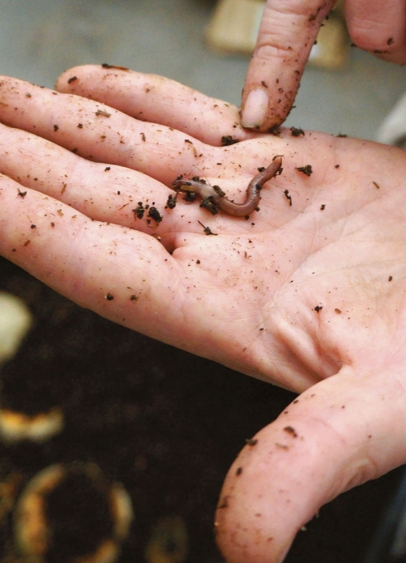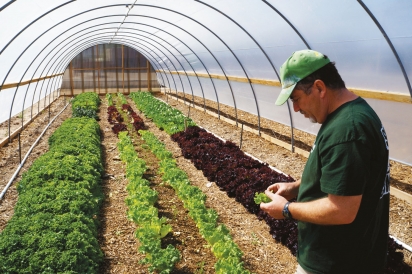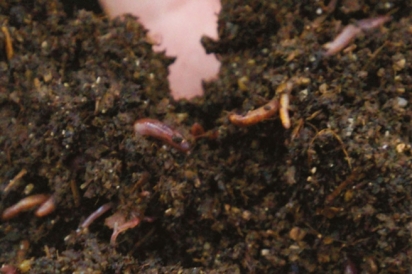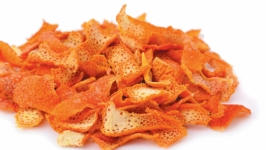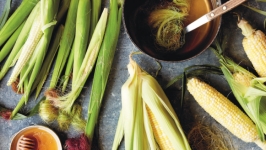A Visit to Arizona Worm Farm
As Zach Brooks of Phoenix learned more and more about sustainability, he envisioned a challenge for himself: “Could I take 10 acres of land and grow enough food for 10 families?”
Last year, Brooks began on that journey. On 10 acres in south Phoenix, he and a few employees established Arizona Worm Farm. They built greenhouses for a variety of vegetables, planted dozens of citrus trees and welcomed several dozen chickens.
The bulk of the operation, though, is about transforming compostable waste into a rich soil for those plants and animals.
“The quest was to figure out how to take other people’s garbage and turn it into food, how to take something we have way too much of and turn it into something useful for us,” Brooks says. “That was really the origin of the worms. The worms really are magnificent little animals that turn garbage into a really, really high-quality fertilizer.”
Arizona Worm Farm is home to millions of red wigglers, a type of earthworm well known for its ability to quickly break down organic food waste. When these worms eat and digest compost, they excrete the nutrient-rich fertilizer known as “worm castings” or “vermicast.”
“Worms let us convert garbage into food for our chickens and food for ourselves,” Brooks explains. “Our idea here is to create a complete cycle: It’s to have fruits and vegetables that feed us and feed the animals and then animals that feed the fruit and vegetables.”
Brooks currently sells about 30,000 to 40,000 worms a week. People can buy whole compost bins or smaller boxes housing about 1,000 worms each. He also sells compost tea, worm castings and mulch, and offers classes on composting with worms. He plans to teach other classes soon as well, including one for children.
Brooks’ focus is the worms, highlighting their role in the farm’s name, but their work leads to an edible end.
“Really, it’s about being a lazy farmer,” Brooks says with a smile. “It’s about doing things in the soil so that the soil wards off pests. It’s about creating an organic, living, dynamic soil where stuff just grows and grows really well.”
While Brooks has just begun working towards his “mental endpoint” of sustaining 10 families on 10 acres, he does aim to use the farm to get many more families growing their own fruits and vegetables with the help of worms.
“What we’d love to see, the long-term goal,” Brooks says, “is to show folks that you can have your own lettuce growing in your own yard where you pick it, you eat it, the waste that you have goes to your worms and the worms feed the lettuce in your backyard.”
Not only does that allow Phoenix-area families to enjoy hyper-local produce, but it takes small steps towards cutting down on food waste.
Globally, about a third of all food grown for humans “is lost or wasted,” according to the United Nations’ Food and Agriculture Organization. In the U.S., 30 to 40% of food is thrown out, according to the U.S. Department of Agriculture, making up the single largest component in municipal landfills.
“We would like to convince 10,000 people to not throw their garbage away but instead use it to grow healthier, safer products in their backyard,” Brooks says.
Arizona Worm Farm not only feeds the waste from its own fruits and vegetables to its worms, but also receives 40 tons of vegetable waste each week from a local bagged salad processor. That dump truck full of the cores and ends of vegetables is just one day’s waste from the processor, Brooks says.
While the worms will feast on most of that, Brooks also tosses vegetable scraps to the chickens, who excitedly peck at the treats. Like the worms, the chickens are an important part of Brooks’ vision for encompassing natural cycles in farming.
The 80-some chickens on the farm are free to run and scratch in dirt and pastured lots, but are able to nest inside an old wagon converted into a henhouse. The mesh floor of the coop allows chicken droppings to fall into the soil below, nurturing the soil and emerging grasses. Doors on the side of the mobile coop let employees easily gather eggs left by the hens.
As with almost every aspect of the farm, Brooks is working at adding another element to caring for the chickens. He is experimenting with growing black soldier flies, which reproduce quickly and are “the perfect protein source for our chickens.”
“Everything I do, I try to do this way,” he says, as he points out the black soldier fly larvae growing in a tub. “I start it in a bucket, figure out how to do it, get it right,” then incorporate it into the rest of the farm.
Brooks also plans to add 150 fruit, shade and nut trees to the farm each year. He wants to add more animals too—likely goats and sheep and perhaps a cow or two—in the coming years.
“It’s like a whole new master’s degree every time you take on a new component to this,” he says about his continued learning.
Brooks does have a master’s degree: A Master of Business Administration in information systems from Arizona State University. He worked for 30 years as a consultant to healthcare companies and went back to ASU a few years ago to pursue a sustainability degree. After beginning the program, though, he opted to leave and learn in the classroom of his own farm. He had been composting with red wigglers for several years already at that point.
“There are lots of books on how to do this, but the reality is that our parents’ parents had been doing this,” he says. “This is the way you did it before Monsanto figured out how to make fertilizer out of chemicals. Our whole goal here is to fertilize the soil and not just the plant.”
He hopes he can be an example of how to grow food “full cycle.”
“We’d like to demonstrate,” he says, “that we can really deliver on the premise of ‘Can you operate when your only input is other people’s garbage?’ and we think you can.”
ARIZONA WORM FARM
8430 S. 19th Ave.
Phoenix, Arizona 85040
602-622-7663
arizonawormfarm.com
The Word on Worms
• Arizona Worm Farm sells red wiggler worms by the pound: about 1,000 worms per pound.
• According to Brooks, in theory, a mature red wiggler (2–3 months old) can lay an egg cocoon every three to four days. Each cocoon will produce one to 11 baby worms in about three weeks. Ideally, that means a population of red wigglers doubles every 12 weeks.
• A red wiggler usually lives 18 to 24 months.
• Brooks usually sells between 30,000 and 40,000 worms each week.


